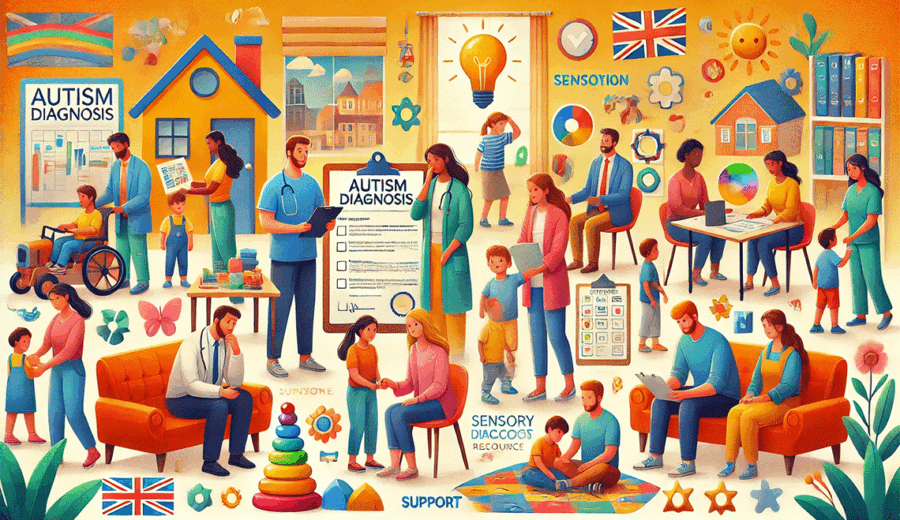
Navigating an Autism Diagnosis in the UK
Navigating an Autism Diagnosis in the UK: Steps to Take and Support Available
Receiving an autism diagnosis for a child can be an emotional and overwhelming experience for parents. While the journey may seem daunting, understanding the steps to take and the support available in the UK can make a significant difference. This comprehensive guide walks parents through the process, from diagnosis to accessing resources.
Understanding the Autism Diagnosis Process in the UK
The process of diagnosing autism in the UK is thorough and involves multiple professionals to ensure an accurate assessment.
Initial Concerns and Referral
Parents are often the first to notice developmental differences in their child, such as delayed speech, difficulty with social interaction, or repetitive behaviors. If you have concerns, the first step is to discuss them with your General Practitioner (GP). Your GP can refer your child to a specialist for further assessment.
The Assessment Process
The assessment typically involves a multidisciplinary team, including pediatricians, psychologists, speech and language therapists, and occupational therapists. They will observe your child, conduct interviews, and use standardized diagnostic tools like the Autism Diagnostic Observation Schedule (ADOS).
Receiving the Diagnosis
Once the assessment is complete, the team will provide a diagnosis if criteria for Autism Spectrum Disorder (ASD) are met. This includes a detailed report outlining your child’s strengths, challenges, and recommended support strategies.
Steps to Take After a Diagnosis
A diagnosis is just the beginning. There are several steps parents can take to ensure their child receives the best possible support.
1. Educate Yourself About Autism
Understanding autism is crucial for providing the right support. Reliable resources like the National Autistic Society (NAS) offer guides, webinars, and workshops for parents.
2. Apply for an Education, Health, and Care Plan (EHCP)
An EHCP is a legal document that outlines the support your child needs in education. To apply, contact your local authority and request an assessment. Schools must follow the EHCP to provide tailored resources, such as one-on-one teaching assistants or sensory-friendly classrooms.
3. Connect With Support Groups
Joining a local or online support group can provide emotional support and practical advice from other parents who understand your journey. Many organizations, including NAS and Scope, offer parent-led groups.
4. Explore Financial Support Options
Raising a child with autism can bring additional costs. Parents in the UK can apply for benefits such as Disability Living Allowance (DLA) and Carer’s Allowance. These benefits help cover therapy, equipment, and other essential expenses.
5. Access Therapy and Intervention Services
Early intervention can significantly improve outcomes for children with autism. Available therapies include:
- Speech and Language Therapy: To enhance communication skills.
- Occupational Therapy: To develop motor skills and manage sensory sensitivities.
- Behavioral Therapies: Such as Applied Behavior Analysis (ABA) to build social and functional skills.
Support Systems Available in the UK
The UK offers a wide range of support services for families of children with autism.
National Autistic Society (NAS)
NAS provides resources, training, and advocacy for individuals and families affected by autism. Their Autism Helpline is a valuable resource for parents seeking guidance.
Educational Support
Schools in the UK are legally required to provide accommodations for children with autism. Special Educational Needs Coordinators (SENCOs) work within schools to ensure children’s needs are met. Some parents may opt for specialist schools that cater to children with autism and other developmental differences.
Healthcare Services
The NHS offers support through Child and Adolescent Mental Health Services (CAMHS) and other specialized autism services. These include diagnostic assessments, therapy referrals, and guidance on managing autism-related challenges.
Community and Charitable Organizations
Local charities often provide social activities, parent workshops, and respite care. These programs help children build social skills and allow parents to connect with their community.
Practical Tips for Managing Life After a Diagnosis
Create a Structured Routine
Children with autism often thrive in predictable environments. Use visual schedules to outline daily activities and reduce anxiety.
Build a Sensory-Friendly Home
Incorporate sensory tools such as weighted blankets, noise-canceling headphones, and fidget toys to help your child self-regulate.
Focus on Strengths and Interests
Celebrate your child’s unique talents and encourage activities that align with their interests. This builds confidence and fosters positive development.
Advocate for Your Child
Be proactive in communicating with schools, healthcare providers, and support services. As a parent, you are your child’s best advocate.
Self-Care for Parents
Caring for a child with autism can be emotionally and physically demanding. Seek respite care when needed, and consider joining mindfulness or stress management programs to maintain your well-being.
Building a Supportive Community
Raising awareness and fostering inclusion are key to creating a better future for children with autism. Attend community events, participate in autism-friendly programs, and encourage schools and workplaces to adopt inclusive practices.
Navigating an autism diagnosis is a journey, but it is one filled with opportunities to learn, grow, and connect. By understanding the steps to take and accessing the wealth of support available in the UK, parents can provide a nurturing environment where their child can thrive.





Leave a Reply